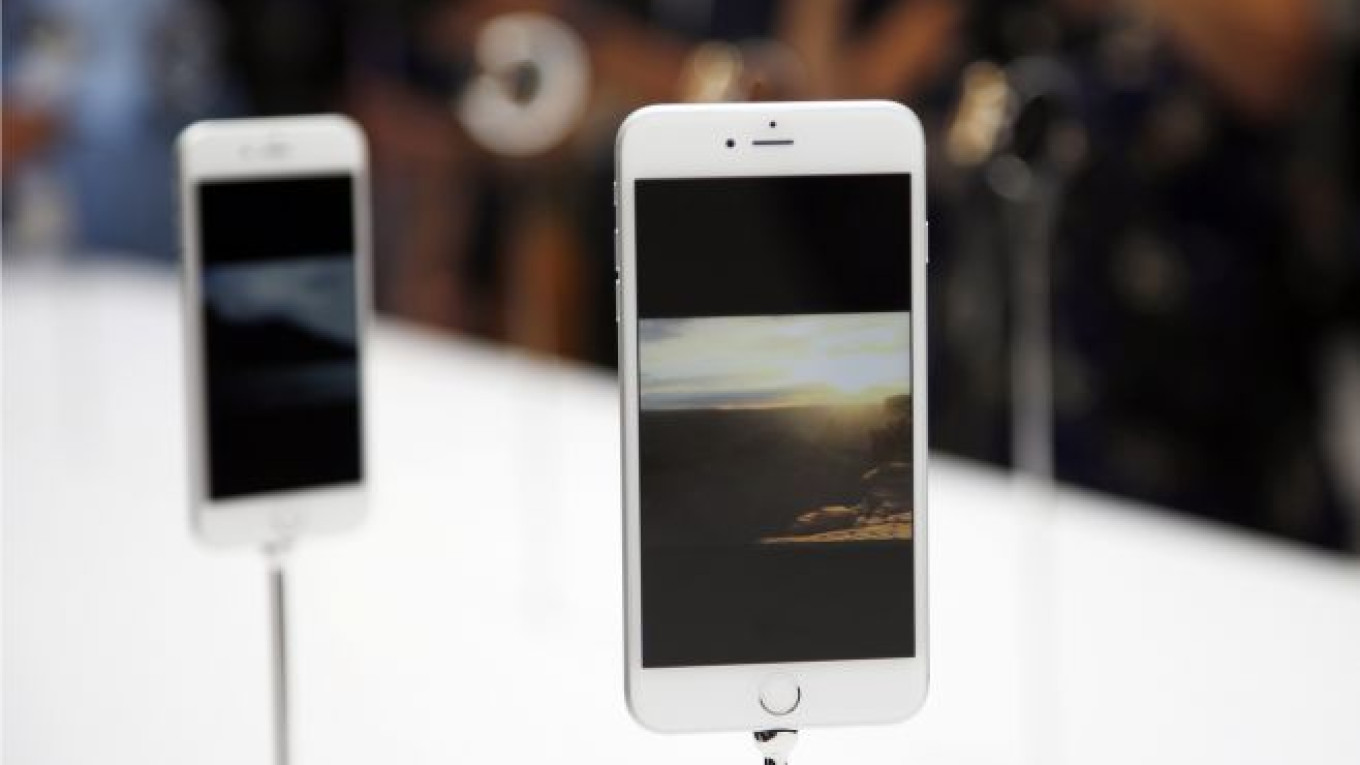Although Apple's new iPhone 6 won't hit Russian shelves until a week after its U.S. launch — on Sept. 26 — and will be around $200 dollars more expensive when it does, that is a breathtaking record for a country used to huge delays and massive mark-ups on Apples' high end gear, according to one of Russia's largest smartphone retailers.
Sergei Tikhonov, spokesperson for mobile retailer Svyaznoi, said the one-week gap is a record for Russia: "3 to 4 years ago ... the official start of Apple sales in our country took place about 4-5 months after the world premier [of a new iPhone]. Now ... it is a little more than two weeks."
Apple this week unveiled its upgrade to the massively successful iPhone family with larger screens to compete with Android-based competitors that have lured customers away from small-screened Apple by selling roomier phones. For the first time in iPhone's history, it will be sold in two sizes — 4.7" and 5.5". The standard iPhone screen size has previously been 4".
When they do arrive, Russians will bow to tradition and pay more than their U.S. peers, despite on average earning 57 percent less, according to data from the Organization for Economic Cooperation and Development.
The standard iPhone 6 will cost anywhere from 32,000 rubles ($860) to 42,000 rubles ($1,130), as compared to the $650 to $850 price range in the U.S.
The average monthly salary in Moscow is about 57,000 rubes ($1,800)? rubles per month. Nationwide, it is about half that.
For the larger-screened iPhone 6 Plus Russian consumers will have to pay anywhere from 37,000 rubles ($995) for the baseline model with 16 gigabytes of storage, up to 47,000 rubles ($1,265) for the 128 gigabyte model.
Pre-orders will be available at Russian retailers on September 19, the day the new phones are released in the U.S.
Despite Apple's huge relative cost in Russia, the brand has risen fast, becoming — especially with the arrival of the iPad — a must-have in Moscow's thriving hipster scene.
"Apple's share of the smartphone market in Russia has been growing over the last two years," said Tikhonov. "Apple devices have traditionally been in the top 3 devices we sell, not only in the upper-price range segment, but in the smartphone market as a whole."
And Apple achieves this despite putting bigger mark-ups on its phones than its rivals. Samsung, Apple's primary competitor in this market, sells its Samsung Galaxy S5 in Russia for 29,990 rubles ($800). In the U.S., the S5 is priced at $750.
Svyaznoi expects strong performance from the iPhone 6 regardless of the competition. One of the primary selling points that may drive Apple's further expansion into the Russian market, aside from its hard hitting brand reputation, is the announcement of the Apple Watch — a "smart" accessory that provides many novel functions that work in tandem with the iPhone, such as health monitoring.
"We expect the Apple Watch in Russia to spur interest in the 'smart' accessories market, which in Russia is growing faster than the world at large," Tikhonov said.
Svyaznoi's forecast for 2014 anticipates that over 220,000 smart accessories from other tech companies will be sold, generating over $1.5 billion in sales.
Contact the author at bizreporter@imedia.ru
A Message from The Moscow Times:
Dear readers,
We are facing unprecedented challenges. Russia's Prosecutor General's Office has designated The Moscow Times as an "undesirable" organization, criminalizing our work and putting our staff at risk of prosecution. This follows our earlier unjust labeling as a "foreign agent."
These actions are direct attempts to silence independent journalism in Russia. The authorities claim our work "discredits the decisions of the Russian leadership." We see things differently: we strive to provide accurate, unbiased reporting on Russia.
We, the journalists of The Moscow Times, refuse to be silenced. But to continue our work, we need your help.
Your support, no matter how small, makes a world of difference. If you can, please support us monthly starting from just $2. It's quick to set up, and every contribution makes a significant impact.
By supporting The Moscow Times, you're defending open, independent journalism in the face of repression. Thank you for standing with us.
Remind me later.


